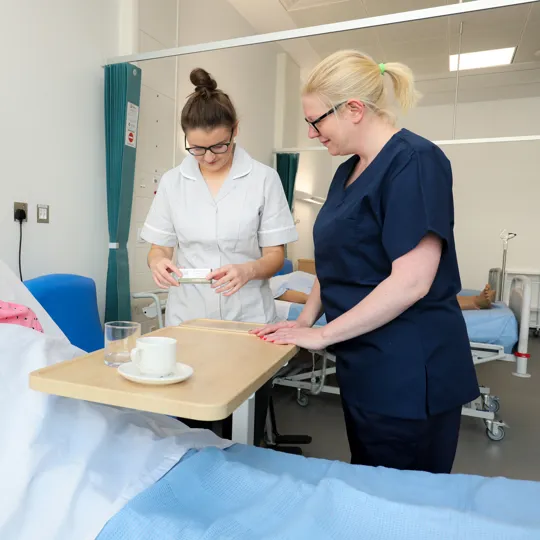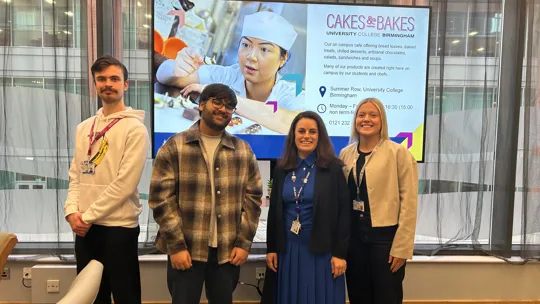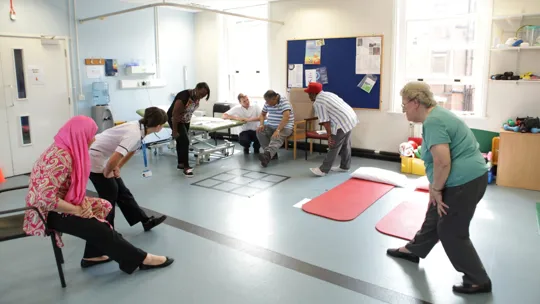May 2025
Blog | How to pursue a career in healthcare without a degree
- About us
- News and Insights
- Blog | How to pursue a career in healthcare without a degree

Read time: approx 1 mins
Did you know you don’t always need a degree to work in healthcare?
In fact, some of the most vital people in the NHS and private sector began their careers without following traditional academic routes. If you’re passionate about helping others, looking for a change of direction, or thinking about your future beyond school, there are plenty of ways to enter the sector without going to medical school.
Whether you’re looking to retrain, earn while you learn, or build your confidence through hands-on experience, this guide will walk you through some of the most accessible – and rewarding – ways to start a career in healthcare.

Begin with real-world experience
One of the most direct routes into healthcare is through experience. Support roles like healthcare assistants, physiotherapy assistants, and mental health support workers are often open to people with no formal qualifications, especially if you show the right values: compassion, reliability, and a willingness to learn.
These roles allow you to work closely with patients and healthcare teams, often in hospitals, GP surgeries, or residential care homes. Many people use them as a stepping stone into more advanced positions over time.
They also give you a realistic view of day-to-day life in care – and a chance to see where your interests might lead you next. Some employers will look for healthcare-related experience, which makes volunteering a fantastic way to get started. If you're starting from scratch, it can be a great opportunity to get your foot in the door.
Hospitals, charities and care services often welcome extra help, and even a small amount of time in a support role can boost your confidence and help you build valuable connections.

Consider an apprenticeship to earn while you learn
If you want to get qualified without taking on full-time university study, apprenticeships offer a great alternative. They allow you to earn a salary while gaining nationally recognised qualifications, with learning built around your job.
Your employer will support you to train while continuing to work, and as you're paid throughout, this route is popular with young people as well as career changers and mature learners.
In healthcare, apprenticeships are available in a growing number of roles, including adult care, pharmacy, dental nursing and healthcare science, but one of the most valuable and flexible options is the Nursing Associate apprenticeship, especially if you’re looking for a long-term career path with room to grow.

Becoming a Nursing Associate through an apprenticeship
Nursing associates play a vital role in modern healthcare. They work alongside registered nurses to provide, monitor and coordinate care in a range of settings – from hospital wards to community clinics and mental health services.
It’s a hands-on, patient-focused role, ideal for people who want to make a real difference without spending years in full-time study. At University College Birmingham, the Nursing Associate FdSc apprenticeship programme is designed for people already working in a health or social care setting who are ready to take the next step. The course runs over two years and blends practical experience with academic study.
It allows you to keep earning while you upskill, and by the end of the programme, you’ll be eligible to register with the Nursing and Midwifery Council (NMC) – a key professional step that formally recognises you as a qualified practitioner. What makes the role even more appealing is the potential to progress.
Many qualified nursing associates go on to become registered nurses through a nursing top-up degree, which builds on your foundation and leads to full NMC registration as a nurse. From there, you can continue developing in specialist areas such as mental health, paediatrics or community nursing – or move into leadership and advanced practice roles over time.

Your career in healthcare changes over time
It’s worth remembering that healthcare careers are not linear. Many people start in one role and grow into others over time.
A healthcare assistant might become a nursing associate; a nursing associate might go on to train as a registered nurse.
With experience, you might even specialise in areas like mental health, paediatrics, or community care.

How can University College Birmingham help?
At University College Birmingham, we understand that not everyone follows the same path into healthcare. That’s why we offer a range of flexible, career-focused options designed to support people at every stage.
Our Nursing Associate apprenticeship is one of the most accessible and rewarding routes into healthcare, particularly for those already working in care and eager to take the next step.
Ready to get started? Find out more about our Nursing Associate FdSc – with hands-on placements and the option to train while you work.
Discover our Kick-Start Scheme.
Explore our Student Stories to hear from people like you who have taken this path and are now building successful careers in healthcare.
Check out our latest news stories

College of Food grad gains prestigious Michelin star for Lichfield restaurant
An acclaimed local restaurant run by a University College Birmingham graduate gains its first Michelin Star.
Read more

College football team tastes victory in first Midlands tournament
A team of further education students from University College Birmingham have brought home the trophy in the Midlands' first C…
Read more
Principal congratulates college students at recognition lunch
Six students were invited to the College’s first-ever Student Recognition Lunch at our award-winning restaurant on campus as part…
Read more
New partnership expands access of award-winning joint pain programme
New partnership gives opportunities for students, as well as providing accredited training.
Read more
University leads the charge towards the UK's battery manufacturing ambitions
Battery Manufacturing Skills Pathway first graduates take their skills and knowledge back into the workplace.
Read more